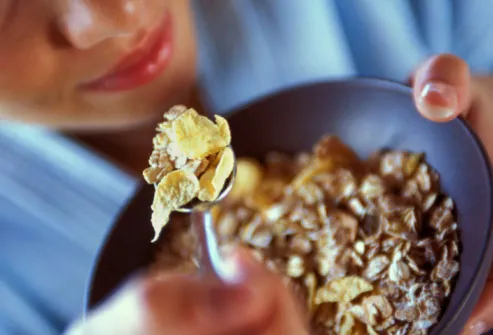The Big Breakfast Diet: What It Is

You've heard it before: Eat breakfast like a king, lunch like a prince, and dinner like a pauper. That's the basis of The Big Breakfast Diet; it's Sunday breakfast every day.
The Big Breakfast Diet is all about when you eat, not what you eat. The diet is described in the book called The Big Breakfast Diet, by Daniela Jakubowicz, MD. Jakubowicz says that eating a 610- to 850-calorie breakfast before 9 a.m. fires up your metabolism by taking advantage of your body's circadian rhythms. These rhythms influence hormones, how your body uses carbohydrates and proteins for fuel, and how efficiently it burns body fat, she says.
On The Big Breakfast Diet, you can eat any foods you want. Ice cream, pizza, donuts -- all are fine for breakfast as long as you eat them along with foods rich in protein and fiber. Follow the plan, Jakubowicz says, and you can lose up to 25 pounds in 30 days.
"When you eat the right foods at the right time, you accelerate your metabolism, satisfy your cravings before they ever occur, and the result: you lose weight," says Jakubowicz.
On the basic, "turbocharged" plan, dieters are allotted about 600 calories for breakfast and another 600 calories divided between lunch and dinner. "Relaxed" and vegetarian options are also outlined in the book.
The Big Breakfast Diet: What You Can Eat
Each day begins with a breakfast that many people will struggle to prepare, consume, and take the time to sit down and eat. And it's not any big breakfast that will keep you feeling full all day. Eating the right combination of protein, carbohydrates, and sweets is important, according to the book.
How does this sample breakfast sound for a start to the day?
- Country-style scrambled eggs made up of 3 egg whites, 2 ounces cheese, 2 ounces ham, and veggies
- Half an English muffin with cream cheese
- Cereal with 8 ounces of milk
- Strawberry smoothie
- A chocolate fudge brownie
Here's how the turbocharged plan breaks down each day:
- Breakfast: 7 servings of protein (including 2 servings of dairy), 2 servings of carbohydrates, 2 servings of fat and 1 sweet.
- Lunch: 3 servings protein, 3 servings low-calorie vegetables, 2 servings starchy/sweeter vegetables, 1 serving fruit.
- Dinner: 0-3 servings of protein, unlimited low-calorie vegetables, 2 servings starchy/sweeter vegetables, 2 servings fruit.
Jakubowicz says protein is the mainstay of the plan because of its well-known ability to provide satiety and feeling of fullness. Carbohydrates are also essential in the morning meal, she says. That's because when consumed before 9 a.m. they are processed differently by the body, increasing energy instead of being stored as fat, she says.
The diet includes a daily sweet at breakfast to fend off cravings before they have a chance to derail your diet. Sample sweets include 8 animal crackers, a 2-inch-square brownie, 6 chocolate kisses, 3 gingersnaps, 14 jelly beans, or 1/4 cup sherbet.
The Big Breakfast Diet: How It Works
You start eating breakfast within 15 minutes of rolling out of bed, and no later than 9 a.m. (or 10 a.m. in fall and winter). Eat lunch by 2 p.m. (3 p.m. in fall and winter), and dinner a few hours later.
And what if you're not hungry in the morning? Within a few weeks of following the plan, you will adjust, Jakubowicz says.
Eating more in the morning can keep you full for up to 14 hours and thus help you eat less throughout the day, says Jakubowicz. But you still need to eat lunch and dinner to avoid a hunger crash later in the day.
If the turbocharged plan contains too few calories to suit you, you can go on the relaxed plan, which allows you a whopping 3,000 calories at breakfast. According to Jakubowicz, there's no such thing as eating too much for breakfast as long as you're finished by 9 a.m. The relaxed plan also allows for a little more fat at both lunch and dinner.
The Big Breakfast Diet: What the Experts Say
Breakfast really is the most important meal of the day, experts say, but it does not necessarily need to be eaten by a certain time -- nor does it need to contain half your daily calories.
"It helps you get your day off to a great start so you can manage your calorie intake better, but there is nothing special about eating before 9 or 10 a.m. or eating 600 calories at breakfast," says Joan Salge Blake, RD, a spokeswoman for the American Dietetic Association.
People who eat a healthy breakfast each day have greater control over their daily calorie intake, and studies have shown that they tend to have lower body weights, Blake says. Skipping breakfast, on the other hand, is associated with higher body weights and an increased risk of obesity.
But at the end of the day, the total number of calories consumed is what matters most for weight control, Blake says.
She also says more research is needed into the role of hormonal rhythms in weight control.
However, she adds, "There is no downside to eating a nutritious breakfast, especially one that contains lean or low-fat protein, whole grains, a little healthy fat, fruits, and vegetables because the fiber, water, and protein will fill you up before it fills you out."
by Kathleen Zelman, MPH, RD, is director of nutrition for WebMD.
No comments:
Post a Comment